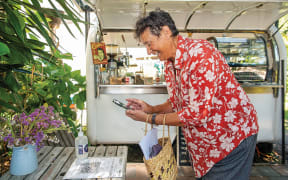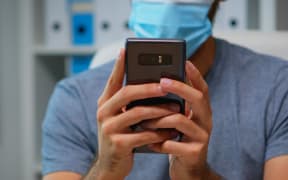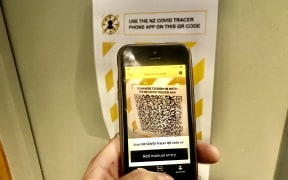A government survey suggests people are becoming increasingly relaxed about protecting themselves from the risk of Covid-19.

The survey shows that in January 27.5 percent of people recorded where they had been and who they were with, which is a sharp drop from September last year. Photo: RNZ
Use of the Tracer app, wearing masks, washing hands, and taking precaution when coughing or sneezing are all being reviewed on a monthly basis by the Ministry of Health. Other survey questions focus on mental health and how worried people are about catching the virus.
The Ministry of Health's latest Health Survey shows that in January 27.5 percent of people recorded where they had been and who they were with. That marks a sharp fall from 45.6 percent of respondents questioned in September last year who said they were doing this.
The survey also shows 73 percent covered their mouth and nose with a tissue, their sleeve or elbow every time they had coughed or sneezed.
Just over 40 percent (42.5 percent) said they still use hand sanitiser or wash hands for at least 20 seconds every time after touching surfaces outside. More than half surveyed (53.1 percent) said they always hit the hand basin for at least 20 seconds before eating or handling food.
In Auckland, quite a few people said they are still observing the 20-second guidance, including a man who did not want his name used.
"Initially it would have been making a conscious effort to count that time, but now it's just habit," he said.
Some others said they are now more relaxed than during last year's outbreak, including Sue.
"Probably not always 20 seconds, maybe 10 or 15. I guess it's just what I'm used to doing and what I've done for years and years here," she said.
Anna Bennington admitted she did not always follow the guidance.
"I'm washing them for a decent amount of time, but probably not usually 20 seconds. I know the happy birthday [song] rule, but I don't always apply it," she said.
Public health professor from the University of Otago, Michael Baker, is sceptical about the percentages. He said, for example, people's self-reported tracer app usage was higher than the actual app use.
"We obviously have to interpret it pretty cautiously because we do know that people are not good at accurately recording or reporting their behaviour."
Baker said people have become too relaxed and the alert level system needs an upgrade. He wants an extra couple of levels that provide more rules on masks and tracer app use, adding that scanning in high-risk areas like bars and restaurants should be mandatory.
"I think we need to have more levels in the system, [it] needs to be more nuanced and the other thing that it needs is to have very clear rules on the use of masks built into it, and so this is one way of dealing with the complacency."
Royal New Zealand College of General Practitioners medical director Dr Bryan Betty said during Covid lockdowns, there were very little flu or serious chest infection due to hand washing, physical distancing and borders being closed and he wanted that to continue.
"Those practices that we had last year in terms of scanning, washing hands and taking precautions and not going to work when we had any cold or flu-like symptoms are very, very important this year," he said.
Data for the survey is captured through face-to-face interviews with more than 13,000 adults and the parents or primary caregivers of more than 4000 children.
- If you have symptoms of the coronavirus, call the NZ Covid-19 Healthline on 0800 358 5453 (+64 9 358 5453 for international SIMs) or call your GP - don't show up at a medical centre





